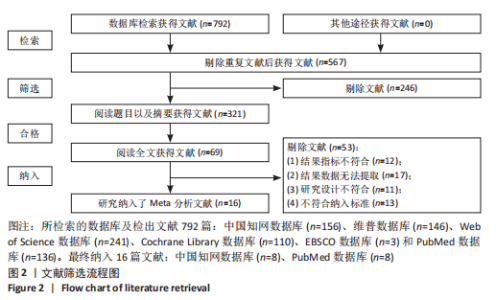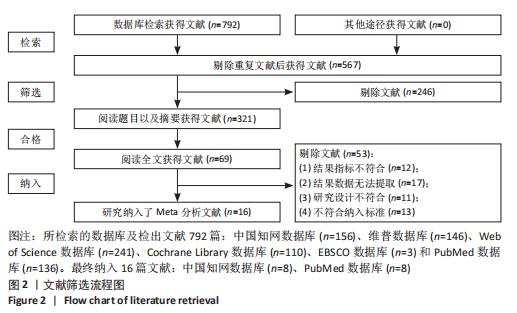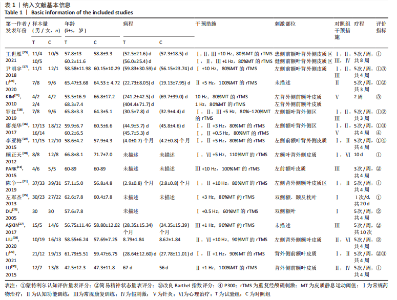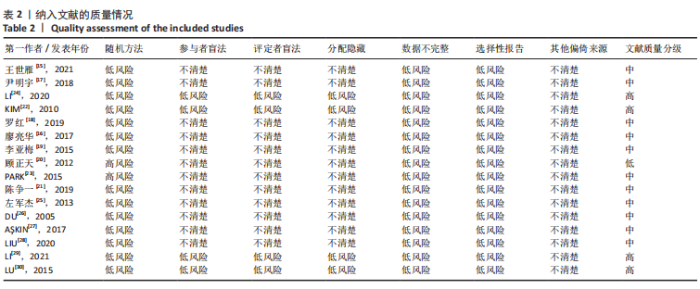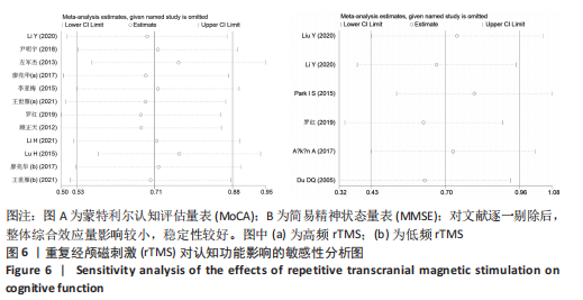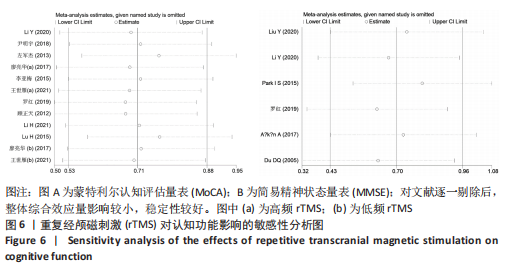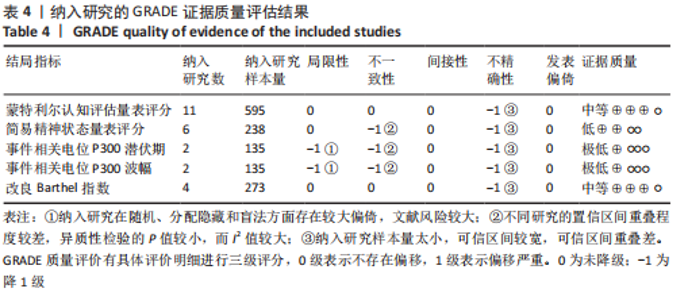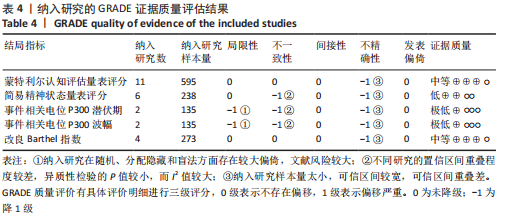Chinese Journal of Tissue Engineering Research ›› 2023, Vol. 27 ›› Issue (20): 3274-3280.doi: 10.12307/2023.150
Therapeutic effect of different-frequency repetitive transcranial magnetic stimulations on post-stroke cognitive impairment: a Meta-analysis
Yin Yikun1, 2, Wang Jialin2, Sun Junzhi2
- 1College of Physical and health Education, Guangxi Normal University, Guilin 541004, Guangxi Zhuang Autonomous Region, China; 2Institute of Sports Medicine and Health, Chengdu Sport University, Chengdu 610041, Sichuan Province, China
-
Received:2022-01-21Accepted:2022-05-24Online:2023-07-18Published:2022-11-21 -
Contact:Sun Junzhi, PhD, Senior laboratory technician, Institute of Sports Medicine and Health, Chengdu Sport University, Chengdu 610041, Sichuan Province, China -
About author:Yin Yikun, Master candidate, College of Physical and health Education, Guangxi Normal University, Guilin 541004, Guangxi Zhuang Autonomous Region, China; Institute of Sports Medicine and Health, Chengdu Sport University, Chengdu 610041, Sichuan Province, China -
Supported by:the National Key Research and Development Project of China, No. 2019YFF0301704 (to SJZ)
CLC Number:
Cite this article
Yin Yikun, Wang Jialin, Sun Junzhi. Therapeutic effect of different-frequency repetitive transcranial magnetic stimulations on post-stroke cognitive impairment: a Meta-analysis[J]. Chinese Journal of Tissue Engineering Research, 2023, 27(20): 3274-3280.
share this article
Add to citation manager EndNote|Reference Manager|ProCite|BibTeX|RefWorks
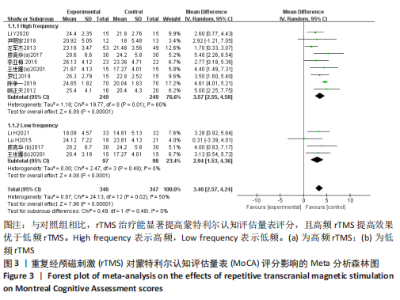
2.3 Meta分析结果 2.3.1 各组蒙特利尔认知评估量表评分差异 共11篇文献报道了经重复经颅磁刺激治疗后蒙特利尔认知评估量表评分结果[15-21,24-25,29-30]。研究间异质性:I2=50%,P=0.02,采用随机效应模型,Meta分析结果显示:重复经颅磁刺激组蒙特利尔认知评估量表评分明显高于对照组(MD=3.40,95%CI:2.57-4.24,P < 0.000 1)。 进一步对不同频率对蒙特利尔认知评估量表评分进行亚组分析发现,结果显示:9篇文献报道了高频经颅磁刺激治疗后评分高于对照组(MD=3.57,95%CI:2.55-4.58,P < 0.000 01) [15-21,24-25];4篇文献报道了低频经颅磁刺激治疗后评分高于对照组(MD=2.94,95%CI:1.53-3.46,P < 0.000 1) [15-16,29-30],高频刺激后的蒙特利尔认知评估量表评分高于低频刺激,见图3。"
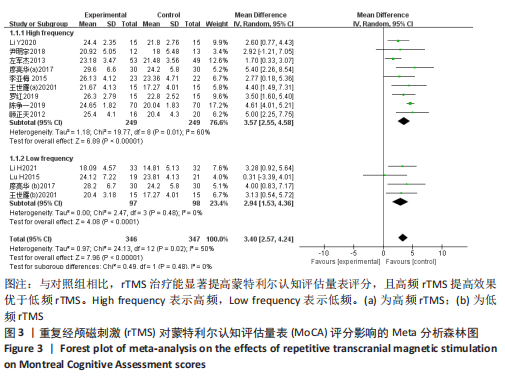
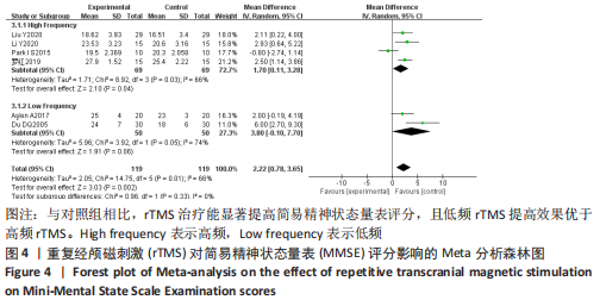
2.3.2 各组简易精神状态量表评分差异 共6篇文献报道了经重复经颅磁刺激治疗后简易精神状态量表评分结果[18,23,26-29]。 研究间异质性:I2=66%,P=0.01,采用随机效应模型进行Meta分析,结果显示:重复经颅磁刺激组简易精神状态量表评分明显高于对照组(MD=2.22,95%CI:0.78-3.65,P=0.002)。进一步对不同频率重复经颅磁刺激进行亚组分析,发现4篇文献报道了高频经颅磁刺激治疗后评分高于对照组(MD=1.70,95%CI:0.11-3.28,P=0.04) [18,23,28-29];2篇文献报道了低频经颅磁刺激治疗后评分略高于对照组,但差异无显著性意义(MD=3.80,95%CI:-0.10-7.70,P=0.06) [26-27],低频刺激后的简易精神状态量表评分高于高频刺激,见图4。"
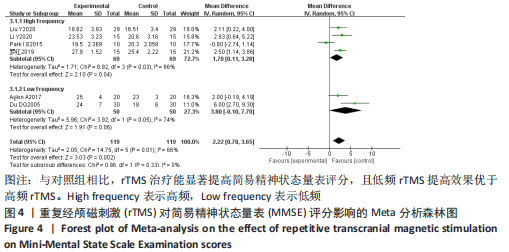
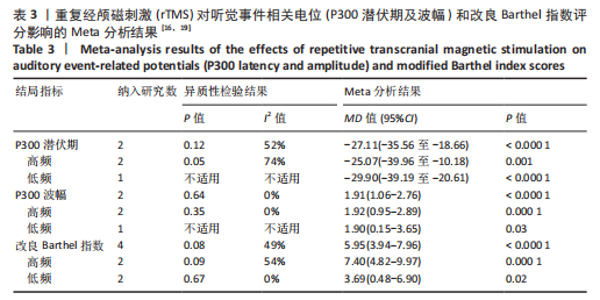
2.3.3 各组听觉事件相关电位(P300潜伏期及波幅)差异 共2篇文献报道了重复经颅磁刺激治疗后P300潜伏期结果[16,19]。 研究间异质性:I2=52%,P=0.12,采用随机效应模型进行Meta 分析,结果显示:重复经颅磁刺激组P300 潜伏期明显低于对照组(MD=-27.11,95%CI:-35.56至-18.66,P < 0.000 1)。进一步对不同频率重复经颅磁刺激进行亚组分析,结果显示:2篇文献报道了高频经颅磁刺激治疗(MD=-25.07,95%CI:-39.96至-10.18,P=0.001 0)[16,19];有1篇文献报道了低频经颅磁刺激治疗后(MD=-29.90,95%CI: -39.19至-20.61,P < 0.000 1), 高频与低频重复经颅磁刺激治疗后P300潜伏期均明显低于对照组,低频刺激后的P300潜伏期降低幅度大于高频刺激[16],见表 3。"
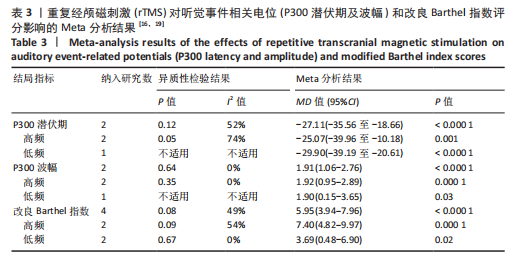
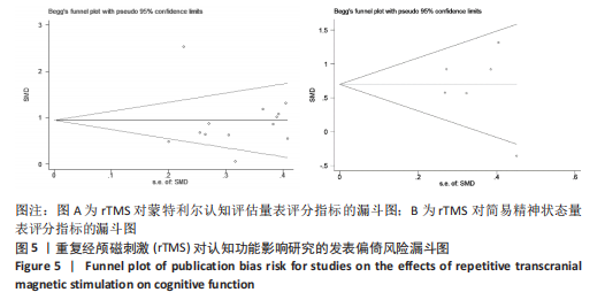
共2篇文献报道了重复经颅磁刺激治疗后P300波幅结果[16,19]。研究间异质性:I2=0%,P=0.64,采用固定效应模型进行 Meta分析,结果显示:重复经颅磁刺激组P300波幅明显高于对照组(MD=1.91,95%CI:1.06-2.76,P < 0.000 1)。进一步对不同频率重复经颅磁刺激进行亚组分析,发现2篇文献报道了高频经颅磁刺激治疗(MD=1.92,95%CI:0.95-2.89,P=0.000 1)[16,19];1篇文献报道了低频经颅磁刺激治疗(MD=1.90,95%CI:0.15-3.65,P=0.03),高频与低频治疗后P300波幅均明显高于对照组,高频刺激后的P300波幅高于低频刺激[15]。 2.3.4 各组改良Barthel指数差异比较 有4篇文献报道了重复经颅磁刺激治疗后改良Barthel指数[16-17,21-22]。研究间异质性:I2=49%,P=0.08,采用固定效应模型进行 Meta分析,结果显示:重复经颅磁刺激组改良Barthel指数明显高于对照组(MD=5.95,95%CI:3.94-7.96,P < 0.000 1)。 进一步对不同频率重复经颅磁刺激进行亚组分析,发现有4篇文献报道了高频经颅磁刺激治疗后(MD=7.40,95%CI:4.82-9.97,P < 0.0001) [16-17,21-22];有2篇文献报道了低频经颅磁刺激治疗后(MD=3.69,95%CI:0.48-6.90,P=0.02),高频与低频治疗后改良Barthel指数均明显高于对照组[16,22],见表3。 2.4 发表偏倚及敏感性分析结果 采用Begg’s 和Egger’s检验对以简易精神状态量表(MMSE)评分和蒙特利尔认知评估量表(MoCA)评分为结果指标分析发表偏倚,检验结果显示:此2个指标漏斗图左右侧研究节点不完全对称,见图5。结合Egger’s检验结果显示MoCA(t=-0.34,P=0.737,P > 0.05)、MMSE(t=-0.46,P=0.666,P > 0.05),说明发表偏倚无显著性差异。"
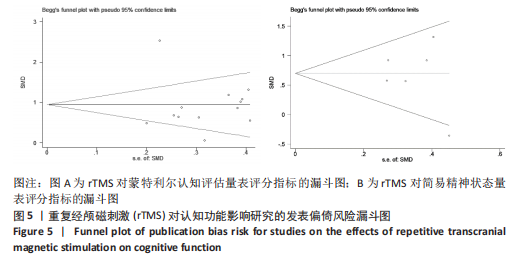
| [1] VABALAITE B, PETRUSEVICIENE L, SAVICKAS R, et al. Effects of high-frequency (HF) repetitive transcranial magnetic stimulation (rTMS) on upper extremity motor function in stroke patients: a systematic review. Medicina (Kaunas, Lithuania). 2021;57(11):1215. [2] KHAKU AS, TADI P. Cerebrovascular Disease. 2021 Sep 29.//StatPearls [Internet]. Treasure Island (FL): StatPearls Publishing. 2022. [3] YANG W, LIU TT, SONG XB, et al. Comparison of different stimulation parameters of repetitive transcranial magnetic stimulation for unilateral spatial neglect in stroke patients. J Neurol Sci. 2015;359(1-2):219-225. [4] SUN JH, TAN L, YU JT. Post-stroke cognitive impairment:epidemiology, mechanisms and management. Ann Transl Med. 2014;2(8):80-95. [5] SNYDER HM, CORRIVEAU RA, CRAFT S, et al. Vascular contributions to cognitive impairment and dementia including Alzheimer’s disease. Alzheimers Dement. 2015;11(6):710-717. [6] JOKINEN H, MELKAS S, YLIKOSKI R, et al. Post-stroke cognitive impairment is common even after successful clinical recovery. Eur J Neurol. 2015;22(9):1288-1294. [7] 陈娟,何昊,杨丹丹,等.重复经颅磁刺激对轻度认知障碍的干预效果[J].心理科学进展,2021, 29(11):2002-2012. [8] ROSSI S, HALLETT M, ROSSINI PM, et al. Safety, ethical considerations, and application guidelines for the use of transcranial magnetic stimulation in clinical practice and research. Clin Neurophysiol. 2009;120(12):2008-2039. [9] LEFAUCHEUR JP, ANDRÉ-OBADIA N, ANTAL A, et al. Evidence-based guidelines on the therapeutic use of repetitive transcranial magnetic stimulation (rTMS). Clin Neurophysiol. 2014;125(11):2150-2206. [10] 中华神经科学会,中华神经外科学会.各类脑血管疾病诊断要点[J].中华神经科杂志,1996, 29(6):60-61. [11] 董强,郭起浩,罗本燕,等.卒中后认知障碍管理专家共识[J].中国卒中杂志,2017,12(6):519-531. [12] CUMPSTON M, LI T, PAGE MJ, et al. Updated guidance for trusted systematic reviews:a new edition of the Cochrane handbook for systematic reviews of interventions. Cochrane Database Syst Rev. 2019;10:ED000142. [13] COCHRANE M, MITCHELL E, HOLLINGWORTH W, et al. Cost-effectiveness of interventions for chronic fatigue syndrome or myalgic encephalomyelitis: a systematic review of economic evaluations. Appl Health Econ Health Policy. 2021;19(4):473-486. [14] ATKINS D, BEST D, BRISS PA, et al. Grading quality of evidence and strength of recommendations. BMJ (Clinical research ed). 2004;328(7454):1490. [15] 王世雁,巩尊科,陈伟,等.不同频率重复经颅磁刺激对卒中后认知障碍的影响[J].中华物理医学与康复杂志,2021,43(8):721-723. [16] 廖亮华,黄东,江兴妹,等.高频与低频重复经颅磁刺激对脑梗死患者认知功能的影响[J].中华物理医学与康复杂志,2017,39(1):56-58. [17] 尹明宇,罗婧,胡昔权,等.高频重复经颅磁刺激对脑卒中后认知功能障碍的影响[J].中国康复医学杂志,2018,33(7):763-769. [18] 罗红,余茜.基于静息态fMRI技术观察高频重复经颅磁刺激对出血性脑卒中认知功能的影响[J].中华物理医学与康复杂志,2019,41(4):279-282. [19] 李亚梅,徐丽,杨艳,等.重复经颅磁刺激对脑梗死后轻度认知功能障碍的影响及安全性研究[J].中国康复理论与实践,2015,21(10):1128-1132. [20] 顾正天,卢建新,张守成,等.重复经颅磁刺激对脑梗死后轻度认知功能障碍患者的疗效[J].中国康复医学杂志,2012,27(10):964-966. [21] 陈争一,龚剑秋,吴越峰,等.重复经颅磁刺激联合认知康复训练治疗脑卒中后认知障碍的疗效观察[J].中华物理医学与康复杂志,2019, 41(3):199-201. [22] KIM BR, KIM DY, CHUN MH, et al. Effect of repetitive transcranial magnetic stimulation on cognition and mood in stroke patients: a double-blind, sham-controlled trial. Am J Phys Med Rehabil. 2010;89(5):362-368. [23] PARK IS, YOON JG. The effect of computer-assisted cognitive rehabilitation and repetitive transcranial magnetic stimulation on cognitive function for stroke patients. J Phys Ther Sci. 2015;27(3):773-776. [24] LI Y, LUO H, YU Q, et al. Cerebral functional manipulation of repetitive transcranial magnetic stimulation in cognitive impairment patients after stroke:an fMRI study. Front Neurol. 2020;11:977. [25] 左军杰,张华.经颅磁刺激对脑梗死后认知障碍的疗效及C反应蛋白和纤维蛋白原的影响[J].中华老年心脑血管病杂志,2013,15(6):614-616. [26] DU DQ, WU YB. Living ability and cognitive function ameliorated by low frequency repetitive transcranial magnetic stimulation in patients with post-stroke depression: comparison with drug plus psychological treatment. Chin J Clin Rehabil. 2005;16:22-23. [27] AŞKIN A, TOSUN A, DEMIRDAL ÜS. Effects of low-frequency repetitive transcranial magnetic stimulation on upper extremity motor recovery and functional outcomes in chronic stroke patients: a randomized controlled trial. Somatosens Mot Res. 2017;34(2):102-107. [28] LIU Y, YIN M, LUO J, et al. Effects of transcranial magnetic stimulation on the performance of the activities of daily living and attention function after stroke: a randomized controlled trial. Clin Rehabil. 2020;34(12):1465-1473. [29] LI H, MA J, ZHANG J, et al. Repetitive transcranial magnetic stimulation (rTMS) modulates thyroid hormones level and cognition in the recovery stage of stroke patients with cognitive dysfunction. Med Sci Monit. 2021;27:e931914. [30] LU H, ZHANG T, WEN M, et al. Impact of repetitive transcranial magnetic stimulation on post-stroke dysmnesia and the role of BDNF Val66Met SNP. Med Sci Monit. 2015;21:761-768. [31] 李格,沈渔邨,陈昌惠,等.简易精神状态检查表在不同人群中的试测研究[J].中国心理卫生杂志,1989,3(4):148-151,147-191. [32] FOLSTEIN MF, FOLSTEIN SE, MCHUGH PR. “Mini- mental state”: a practical method for grading the cognitive state of patients for the clinician. J Psychiatr Res. 1975;12(3):189-198. [33] 周小炫,谢敏,陶静,等.简易智能精神状态检查量表的研究和应用[J].中国康复医学杂志, 2016,31(6):694-696,706. [34] 林智敏,刘子科,林锦波,等.蒙特利尔认知评估量表(中文版)在颅脑损伤患者中的信度和效度研究[J].齐齐哈尔医学院学报,2012, 33(11):1424-1426. [35] 郭辉,王剑桥,苏国栋,等.神经肌肉本体感觉促进疗法对脑卒中患者平衡、运动和日常生活活动效果的Meta分析[J].中国康复理论与实践, 2021,27(5):530-541. [36] RUSHBY JA, BARRY RJ, JOHNSTONE SS. Event-related potential correlates of serial-position effects during an elaborative memory test. Int J Psychophysiol. 2002;46(1):13-27. [37] DEJANOVIĆ M, IVETIĆ V, NESTOROVIĆ V, et al. The role of P300 event-related potentials in the cognitive recovery after the stroke. Acta Neurol Belg. 2015;115(4):589-595. [38] HOOGENDAM JM, RAMAKERS GM, DI LAZZARO V. Physiology of repetitive transcranial magnetic stimulation of the human brain. Brain Stimul. 2010;3(2):95-118. [39] VILBERG KL, RUGG MD. Memory retrieval and the parietal cortex: a review of evidence from a dual-process perspective. Neuropsychologia. 2008;46(7):1787-1799. [40] POLICH J. Clinical application of the P300 event-related brain potential. Phys Med Rehabil Clin N Am. 2004;15(1):133-161. [41] 刘传玉,梅元武,张小乔.经颅磁刺激对脑缺血大鼠功能恢复和健侧突触结构的影响[J].中华物理医学与康复杂志,2005,27(12):707-710. [42] 赵静,易正辉,王继军.重复经颅磁刺激治疗认知功能障碍的研究进展[J].精神医学杂志, 2011,24(2):145-147. [43] RACHID F. Repetitive transcranial magnetic stimulation and treatment-emergent mania and hypomania: a review of the literature. J Psychiatr Pract. 2017;23(2):150-159. [44] PECUCH PW, EVERS S, FOLKERTS HW, et al. The cerebral hemodynamics of repetitive transcranial magnetic stimulation. Eur Arch Psychiatry Clin Neurosci. 2000;250(6):320-324. [45] LIU M, BAO G, BAI L, et al. The role of repetitive transcranial magnetic stimulation in the treatment of cognitive impairment in stroke patients: a systematic review and meta-analysis. Sci Prog. 2021;104(2):368504211004266. [46] YUE L, XIAO-LIN H, TAO S. The effects of chronic repetitive transcranial magnetic stimulation on glutamate and gamma-aminobutyric acid in rat brain. Brain Res. 2009;1260:94-99. [47] AYDIN-ABIDIN S, TRIPPE J, FUNKE K, et al. High- and low-frequency repetitive transcranial magnetic stimulation differentially activates c-Fos and zif268 protein expression in the rat brain. Exp Brain Res. 2008;188(2):249-261. [48] TENG Z, DONG Y, ZHANG D, et al. Cerebral small vessel disease and post-stroke cognitive impairment. Int J Neurosci. 2017;127(9):824-830. [49] IHLE-HANSEN H, HAGBERG G, FURE B, et al. Association between total-Tau and brain atrophy one year after first-ever stroke. BMC Neurol. 2017;17(1):107. [50] LIM JS, KWON HM, LEE YS. Effect of cholinergic pathway disruption on cortical and subcortical volumes in subcortical vascular cognitive impairment. Eur J Neurol. 2020;27(1):210-212. [51] CAO M, LI X. Effectiveness of modified constraint-induced movement therapy for upper limb function intervention following stroke: a brief review. Sports Med Health Sci. 2021;3(3):134-137. |
| [1] | Wang Yanjin, Zhou Yingjie, Chai Xubin, Zhuo Hanjie. Meta-analysis of the efficacy and safety of 3D printed porous titanium alloy fusion cage in anterior cervical discectomy and fusion [J]. Chinese Journal of Tissue Engineering Research, 2023, 27(9): 1434-1440. |
| [2] | Jiang Xiaocheng, Shi Lu, Wang Yinbin, Li Qiujiang, Xi Chuangzhen, Ma Zefeng, Cai Lijun. Systematical evaluation of bone fusion rate after interbody fusion in patients with osteoporosis and lumbar degenerative disease treated with teriparatide [J]. Chinese Journal of Tissue Engineering Research, 2023, 27(9): 1427-1433. |
| [3] | Yu Wenqiang, Ren Fuchao, Shi Guohong, Xu Yuanjing, Liu Tongyou, Xie Youzhuan, Wang Jinwu, . Methods and application of gait analysis of lower limbs after stroke [J]. Chinese Journal of Tissue Engineering Research, 2023, 27(8): 1257-1263. |
| [4] | Nie Chenchen, Su Kaiqi, Gao Jing, Fan Yongfu, Ruan Xiaodi, Yuan Jie, Duan Zhaoyuan, Feng Xiaodong. The regulatory role of circular RNAs in cerebral ischemia-reperfusion injury [J]. Chinese Journal of Tissue Engineering Research, 2023, 27(8): 1286-1291. |
| [5] | Li Wenjie, You Aijia, Zhou Junli, Fang Sujuan, Li Chun. Effects of different dressings in the treatment of burn wounds: a network meta-analysis [J]. Chinese Journal of Tissue Engineering Research, 2023, 27(7): 1141-1148. |
| [6] | Chen Guanting, Zhang Linqi, Li Qingru. Meta-analysis of the value of exosomal miRNA for the diagnosis of chronic kidney disease [J]. Chinese Journal of Tissue Engineering Research, 2023, 27(6): 970-976. |
| [7] | Yan Le, Zhang Huiping, Dai Lintong. Mesenchymal stem cells for allergic rhinitis: a meta-analysis based on animal experiments [J]. Chinese Journal of Tissue Engineering Research, 2023, 27(6): 977-984. |
| [8] | Feng Liang, Gong Shuhui, Huo Hongfeng. Effect of short-foot training on foot and ankle function in patients with flat feet: Meta-analysis and systematic review [J]. Chinese Journal of Tissue Engineering Research, 2023, 27(5): 799-804. |
| [9] | Pan Weimin, Wang Bing, Han Yabing, Li Ting, Song Jiaqi, Qin Huasheng, Liu Yang. Effects of blood flow restriction training on muscle strength, muscle mass and physical performance in older adults: a Meta-analysis [J]. Chinese Journal of Tissue Engineering Research, 2023, 27(5): 805-812. |
| [10] | Yu Jiaan, Liu Xinwei, Lian Hongyu, Liu Kexin, Li Zitao. Medial open-wedge tibial osteotomy versus lateral closed-wedge tibial osteotomy for unicompartmental knee osteoarthritis: a meta-analysis [J]. Chinese Journal of Tissue Engineering Research, 2023, 27(4): 632-639. |
| [11] | Xu Yangyang, He Peiliang, Meng Qingqi, Li Siming. A meta-analysis of the effects of continuous adductor canal block and continuous femoral nerve block on early activity after knee arthroplasty [J]. Chinese Journal of Tissue Engineering Research, 2023, 27(4): 640-645. |
| [12] | Chai Hao, Yang Deyong, Zhang Lei, Shu Li. 3D printing personalized osteotomy guide technology versus conventional total knee arthroplasty on the accuracy of lower limb force alignment: a meta-analysis [J]. Chinese Journal of Tissue Engineering Research, 2023, 27(4): 646-654. |
| [13] | You Aijia, Li Wenjie, Zhou Junli, Li Chun. Systematic evaluation of six dressings on wound safety following total hip and knee arthroplasty [J]. Chinese Journal of Tissue Engineering Research, 2023, 27(3): 486-492. |
| [14] | Ma Maoxiao, Cui Guofeng, Zhang Xue, Zhang Hong, Liu Youwen, Yue Chen. Complications after spinal fusion in patients with metabolic syndrome: a systematic review and meta-analysis [J]. Chinese Journal of Tissue Engineering Research, 2023, 27(22): 3602-3608. |
| [15] | Zhang Qian, Bian Minjie, He Qin, Huang Dongfeng. Predicting vascular mild cognitive impairment based on vascular risk factors: construction and application of a support vector machine model [J]. Chinese Journal of Tissue Engineering Research, 2023, 27(2): 287-292. |
| Viewed | ||||||
|
Full text |
|
|||||
|
Abstract |
|
|||||
